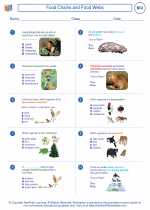Food Chains and Food Webs -> protozoa
Protozoa
Protozoa are single-celled eukaryotic microorganisms that belong to the kingdom Protista. They are found in various aquatic and terrestrial environments and play important roles in nutrient cycling and food webs. Protozoa exhibit diverse morphological and physiological characteristics, and they can be classified into different groups based on their mode of locomotion and other features.
Morphology and Structure
Protozoa exhibit a wide range of morphological diversity, including shapes such as spherical, elongated, and asymmetrical. They possess a nucleus, cytoplasm, and various organelles such as mitochondria, Golgi apparatus, and vacuoles. Some protozoa also have specialized structures for locomotion, feeding, and defense, such as cilia, flagella, and pseudopodia.
Classification
Protozoa are classified into different groups based on their mode of locomotion:
- Flagellates: Protozoa that move using flagella, such as Trypanosoma and Euglena.
- Ciliates: Protozoa that move using cilia, such as Paramecium and Stentor.
- Sarcodines: Protozoa that move using pseudopodia, such as Amoeba and Foraminifera.
- Apicomplexans: Protozoa that are parasitic and have complex life cycles, such as Plasmodium and Toxoplasma.
Ecological Importance
Protozoa play important roles in various ecological processes, such as nutrient cycling and food webs. They are primary consumers in aquatic ecosystems, feeding on bacteria and other microorganisms, and serving as a food source for higher trophic levels. Additionally, some protozoa form mutualistic relationships with other organisms, contributing to the overall biodiversity of ecosystems.
Study Guide
To study protozoa effectively, consider the following key points:
- Understand the basic characteristics of protozoa, including their single-celled nature and eukaryotic structure.
- Learn about the different groups of protozoa and their modes of locomotion.
- Explore the ecological roles of protozoa and their significance in nutrient cycling and food webs.
- Examine the impact of protozoa on human health, including their role as parasites and pathogens.
- Utilize microscopy and laboratory techniques to observe and study protozoa in various environments.
[Protozoa] Related Worksheets and Study Guides:
.◂Biology Worksheets and Study Guides High School. Food Chains and Food Webs

 Worksheet/Answer key
Worksheet/Answer key
 Worksheet/Answer key
Worksheet/Answer key
 Vocabulary/Answer key
Vocabulary/Answer key
 Vocabulary/Answer key
Vocabulary/Answer key
